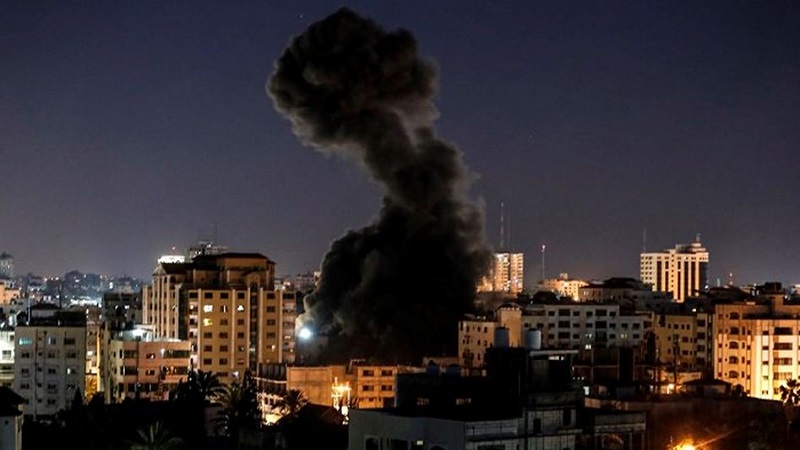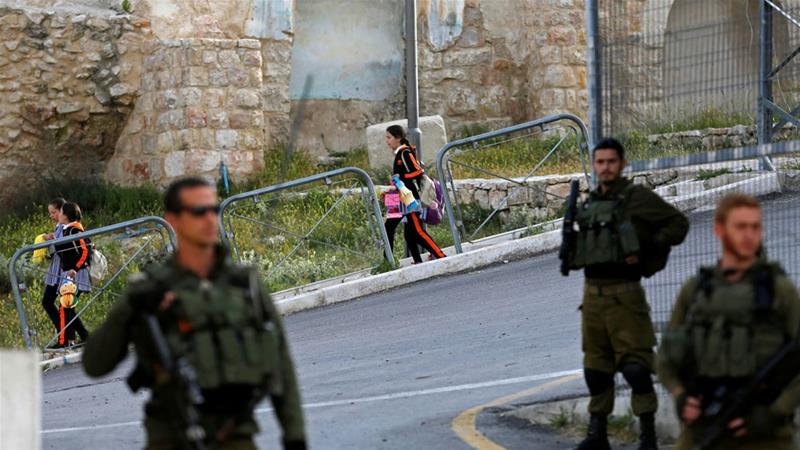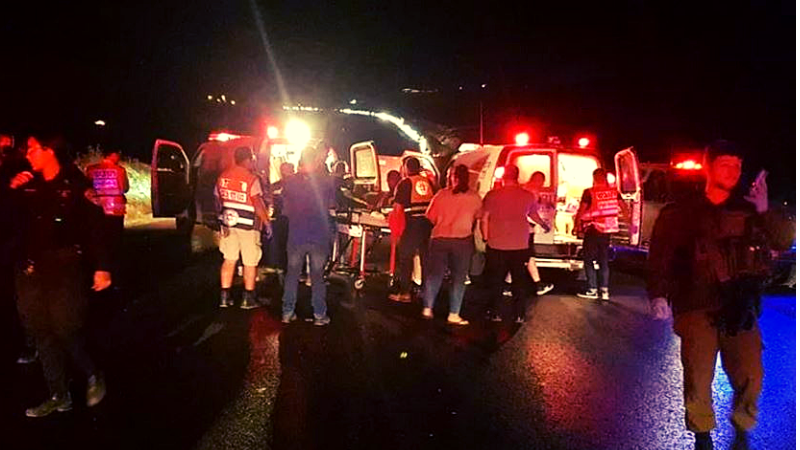PCHR Weekly Report On Israeli Human Rights Violations in the Occupied Palestinian Territory (18 – 24 April 2019)
Sabtu, 27 April 2019 2:45:41 PG
1.jpg)
Israeli forces continued with systematic crimes, in the occupied Palestinian territory (oPt), for the week of 18 – 24 April, 2019.
Israeli forces continued to use excessive force against peaceful protestors in the Gaza Strip. 92 Palestinian civilians, including 22 children, 5 women, 5 journalists, and 5 paramedics, were wounded. Two of them sustained serious wounds. Four Palestinian civilians, including two journalists, were wounded in the weekly Kafr Qaddoum peaceful protest, north of the West Bank.
Shooting:
- In the Gaza Strip, the Israeli forces continued to use lethal force against the participants in the peaceful protests organized along the Gaza Strip borders, which witnessed the peaceful protests for the 55th week along the eastern and northern border area of the Gaza Strip. They also continued to use force as well during the incursions into the West Bank. In the Gaza Strip, Israeli forces wounded 92 Palestinian civilians, including 22 children, 5 women, 5 journalists, and 5 paramedics. The injury of two of them was reported serious. In the West Bank, Israeli forces wounded 4 Palestinian civilians, including two journalists, in the weekly Kafer Qaddoum peaceful protest.
Injuries in the Gaza Strip from 18 to 24 April 2019 According to the Governorate
| Governorate | Injuries | |||||
| Total | Children | Women | Journalists | Paramedics | Critical Injuries | |
| Northern Gaza Strip | 9 | 2 | 1 | 0 | 0 | 0 |
| Gaza City | 32 | 6 | 1 | 1 | 0 | 0 |
| Central Gaza Strip | 15 | 4 | 1 | 1 | 2 | 2 |
| Khan Yunis | 19 | 4 | 2 | 1 | 3 | 0 |
| Rafah | 17 | 6 | 0 | 2 | 0 | 0 |
| Total | 92 | 22 | 5 | 5 | 5 | 2 |
- As part of targeting the Palestinian fishermen in the sea, the Israeli forces continued to escalate their attacks against the Palestinian fishermen, indicating the on-going Israeli policy to target their livelihoods. During the reporting period, PCHR documented two incidents were as follows: 2 incidents off Rafah Shore and 1 off Khan Younis Shore.
- As part of targeting the border areas, Israeli forces stationed along the border fence with Israel, east of Khan Yunis, south of the Gaza Strip, opened fire at agriculture lands, east of Khuza’a, and no injuries nor damage to property were reported. The Israeli shooting at the abovementioned agriculture lands recurred on 21 and 22 April 2019, and no injuries nor damage to property were reported.
- On 21 April 2019, Israeli forces stationed along the border fence with Israel, east of al-Shawka village, east of Rafah, fired live bullets and tear gas canisters at civilians, who were collecting gravels near Sofa Site, and no injuries were reported. The Israeli shooting at the abovementioned area recurred on 22 and 24 April 2019, and no injuries were reported.
- During the reporting period, Israeli forces wounded 4 Palestinian civilians, including 2 journalists, in the weekly Kafer Qaddoum peaceful protest in northern West Bank.
- Collective Punishment Policy
- As part of the collective punishment policy adopted by the Israeli forces against the families of Palestinians accused of carrying out attacks against Israeli soldiers and/or settlers, on 19 April 2019, Israeli forces demolished two residential apartments belonging to the family of ‘Arafat Irfa’iyah in Dahiyat al-Balad area in southern area of Hebron. Each apartment was built on an area of 150 square meters; the first apartment sheltered his parents and two brothers while the second one was uninhabited. It should be noted that ‘Arafat was arrested by the Israeli forces on 09 February 2019, accusing him of killing an Israeli settler found on 07 February 2019 in forests near Al-Quds (Jerusalem).
- In the same context, on 24 April 2019, the Israeli forces blew up a house belonging to the family Omar Abu Laila in al-Zawiyah village, west of Salfit. It should be noted that the above-mentioned building was comprised of 2 floors; each had 4 apartments, sheltering 4 families comprised of 18 individuals, including 10 children and 2 elderly women. Each apartment was built on an area of 130 square meters. As a result of blowing up the apartment, the other 3 apartments in the building fully sustained material damage to their contents. In addition, the nearby houses sustained material damage as their windows glass broke down. It should be noted that the Israeli forces accused Omar Abu Laila of carrying out stabbing and shooting attacks at the intersection of “Ariel” settlement on 17 March 2019, in which a settler and a soldier were killed. On 19 March 2019, the Israeli forces killed Omar Abu Liala in an armed clash in Abuwin village, north of Ramallah, and his body is so far in the Israeli custody.
Incursions:
During the reporting period, Israeli forces conducted at least 59 military incursions into Palestinian communities in the West Bank and 3 other incursions into Al-Quds (Jerusalem) and its suburbs. During those incursions, Israeli forces arrested at least 44 Palestinians, including 8 children and a woman, from the West Bank, while 8 other civilians, including 5 children, were arrested from Al-Quds (Jerusalem) and its suburbs.
Israeli Forces continued their settlement activities, and the settlers continued their attacks against Palestinian civilians and their property
- As part of the Israeli house demolitions and notices, on 18 April 2019, Israeli forces moved into Sosiyia village, south of Yatta, south of Hebron. The Israeli Civil Administration staff dismantled a 30-sqaure-meter residential tent built of metal poles and sheds. The tent belongs to Hussain Radi Hussain Nawaj’ah (40). The Israeli forces leveled the area and then confiscated the tent. The Israeli authorities claimed that there was a decision issued by the Israeli Supreme Court to freeze the construction works in al-Sosiyia village and any new building will be demolished or confiscated without a prior notice. It should be noted that the Israeli forces dismantled a residential tent and demolished a barn belonging to Hussain Radi Hussain Nawaj’ah on 16 April 2019. The tent was later confiscated.
Use of Force against Demonstrations in Protest against the U.S. President’s Decision to Recognize Al-Quds (Jerusalem) as the Capital of Israel:
Israeli forces continued its excessive use of lethal force against peaceful demonstration organized by Palestinian civilians in the West Bank and Gaza Strip, and it was named as “The Great March of Return and Breaking Siege.” The demonstration was in protest against the U.S. President Donald Trump’s declaration to move the U.S. Embassy to it. According to PCHR fieldworkers’ observations, the border area witnessed large participation by Palestinian civilians as the Israeli forces continued to use upon highest military and political echelons excessive force against the peaceful demonstrators, though the demonstration were fully peaceful. The demonstration was as follows during the reporting period:
Gaza Strip:
During the 55th week of the March of Return and Breaking Siege activities, Israeli forces wounded 92, including 22 children, four women, five journalists, and five paramedics. Two of them sustained serious wounds. The incidents were as follows:
- Northern Gaza Strip: The Israeli shooting at Palestinian demonstrators resulted in the injury of 22 Palestinian civilians, including two children and a woman. Three of them were hit with live bullets and shrapnel, three with a rubber bullet and three were directly hit with tear gas canisters.
- Gaza City: the Israeli shooting at Palestinian demonstrators resulted in the injury of 32 Palestinian civilians, including six children and a journalist. Sixteen of them were hit with live bullets and shrapnel, six were hit with rubber bullets and ten were directly hit with tear gas canister.
- Central Gaza Strip: The Israeli shooting at Palestinian demonstrators, which continued from 15:00 until 19:00, resulted in the injury of 15 Palestinian civilians, including four children, a woman, a journalist, and two paramedics. Two of them were transferred to al-Shifa Hospital in Gaza as their wounds were classified as serious. Six of them were hit with live bullets and shrapnel and nine were directly hit with tear gas canisters and rubber bullets. The wounded journalist was identified as Mohammad Baker Mahmoud al-Looh (31), from Nuseirat, who works at al-Watan Radio and was hit with a tear gas canister to the left knee. The wounded paramedics were identified as Mohammad Subhi Hassam al-‘Omari (54), from Deir al-Balah, who was directly hit with a tear gas canister to the left leg, and Ahmad Ibrahim Jameel Weshah (25), a volunteer paramedic, who was directly hit with rubber bullet to the head. Both of them work at Palestine Red Crescent Society (PRCS).
- Khan Younis: The Israeli shooting at the demonstrators, which continued from 16:00 until 19:00, resulted in the injury of 19 demonstrators, including four children, two woman, a journalist, and three paramedics. Six of them were hit with live bullets and shrapnel, one with rubber bullets and 12 were directly hit with tear gas canisters. The wounded paramedics were identified as Daila Bassam Ahmad Abu Rida (20), who is a member of Rowad el-Salam Medical Team and was hit with a tear gas canister to the right leg; Mohammad Subhi Abu Ta’ima (24), who is a member of Watan Medical Team and was directly hit with a tear gas canister to the right leg; and Ahmad Saleh Ahmad al-Naqa (32), who works as a paramedic and a media officer at Civil Defense and was directly hit with a tear gas canister to the neck. The wounded journalist was identified as Yusuf Mohammad Qassem Mass’oud (27), who works as a freelance photojournalist and was hit with a shrapnel to the left thigh.
- Rafah: The Israeli shooting at the demonstrators, which continued from 16:00 until 18:30, resulted in the injury of 17 demonstrators, including six children and two journalists. Five of them were hit with live bullets and shrapnel and 12 were directly hit with tear gas canisters. The wounded journalists were identified as ‘Abdul Raheem Mohammad Deen al-Khateeb (42), who was hit with a tear gas canister to the left thigh, and Mo’ath Fathy Yusuf al-Hams (23), who was hit with a tear gas canister to the left leg. Both of them work as freelance journalists.
West Bank:
- At approximately 13:00, on Friday, 05 April 2019, on Friday afternoon, Palestinian peaceful demonstrators started from the center of Kufor Qadoum village, northeast of Qalqiliyah, the eastern entrance to the village, which has been closed for 15 years in favor of “Kedumim” settlement established on the village’s lands. The demonstrators chanted national slogans demanding end of occupation and condemning the Israeli forces’ crimes against Palestinian protestors along the eastern border of the Gaza Strip within “The Great March of Return and Breaking the Siege” activities. The demonstrators threw stones at Israeli forces stationed behind sand berms. The Israeli forces immediately fired rubber bullets, sound bombs and tear gas canisters at them. As a result, four civilians, including two journalists, were wounded. The wounded journalists were identified as:
1- Nedal Shafeek Taher Eshtiah (50), who works as a photojournalist at Xinhua News Agency, was hit with a rubber bullet to the right leg.
2-Ayman Ameen al-Nobany (32), who works as a photojournalist at Palestinian News and Info Agency (WAFA), was hit with a rubber bullet to the thigh.
- Efforts to Create A Jewish majority
Israeli forces escalated their attacks on Palestinian civilians and their property. They have also continued their raids on al-Aqsa Mosque and denied the Palestinians access to it:
Arrests and Incursions:
- At approximately 04:00 on Thursday, 18 April 2019, Israeli forces moved into Silwan village, south of occupied East Al-Quds (Jerusalem). They raided and searched houses, from which they arrested five civilians, including three children, and then took them to Salah al-Deen Police Station in the center of the village. The arrested civilians were identified as Mohamed Sameeh ‘Oliyan (13), Mo’tasem Mohamed Abu Nab (17), Ziyad Khalil al-Rajbi (19), Anas al-Khatib (19), and Mohamed al-Khatib (14).
- At approximately 01:00 on Monday, 22 April 2019, Israeli forces moved into Ras Shehada neighborhood in Sho’fat refugee camp, north of occupied East Al-Quds (Jerusalem). They raided and searched houses, from which they arrested Malek Naser Hoshieh (15) and Saleh Mohamed al-Sharqawi (14).
- At approximately 03:00 on Monday, Israeli forces moved into al-Tour neighborhood, east of occupied East Al-Quds's (Jerusalem's) Old City. They raided and searched a house belonging to Mostafa Jameel al-Hashlamoun (22) and then handed him a notice to refer to the Israeli Intelligence Service in al-Maskobiyia investigation center, west of Al-Quds (Jerusalem), on 30 April 2019.
- At approximately 14:00 on Tuesday, 23 April 2019, Israeli police stationed at al-Majles Gate, one of al-Aqsa Mosque gates, in occupied East Al-Quds's (Jerusalem's) Old City, arrested the director of the Islamic museum of the mosque, ‘Arafat ‘Amri (54), after detaining his ID card. He was then taken to “ Beit al-‘Aho” investigation center in the Old City.
Settlement activities and attacks by settlers against Palestinian civilians and property
Israeli forces’ attacks:
- At approximately 09:00 on Thursday, 18 April 2019, Israeli forces backed by military vehicles and accompanied with a bulldozer and a vehicle of the Israeli Civil Administration moved into Sosiyia village, south of Yatta, south of Hebron. The Israeli Civil Administration staff dismantled a 30-sqaure-meter residential tent built of metal poles and sheds. The tent belongs to Hussain Radi Hussain Nawaj’ah (40). The Israeli forces leveled the area and then confiscated the tent. The Israeli authorities claimed that there was a decision issued by the Israeli Supreme Court to freeze the construction works in al-Sosiyia village and any new building will be demolished or confiscated without a prior notice. It should be noted that the Israeli forces dismantled a residential tent and demolished a barn belonging to Hussain Radi Hussain Nawaj’ah on 16 April 2019. The tent was later confiscated.
- Recommendations to the International Community
PCHR warns of the escalating settlement construction in the West Bank, the attempts to legitimize settlement outposts established on Palestinian lands in the West Bank and the continued summary executions of Palestinian civilians under the pretext that they pose a security threat to the Israeli forces. PCHR reminds the international community that thousands of Palestinian civilians have been rendered homeless and lived in caravans under tragic circumstances due to the latest Israeli offensive on the Gaza Strip that has been under a tight closure for almost 11 years. PCHR welcomes the UN Security Council’s Resolution No. 2334, which states that settlements are a blatant violation of the Geneva Conventions and calls upon Israel to stop them and not to recognize any demographic change in the oPt since 1967. PCHR hopes this resolution will pave the way for eliminating the settlement crime and bring to justice those responsible for it. PCHR further reiterates that the Gaza Strip and the West Bank, including East Al-Quds (Jerusalem), are still under Israeli occupation in spite of Israel’s unilateral disengagement plan of 2005. PCHR emphasizes that there is international recognition of Israel’s obligation to respect international human rights instruments and international humanitarian law. Israel is bound to apply international human rights law and the law of war, sometimes reciprocally and other times in parallel, in a way that achieves the best protection for civilians and remedy for the victims.
- PCHR calls upon the international community to respect the Security Council’s Resolution No. 2334 and to ensure that Israel respects it as well, in particular point 5 which obliges Israel not to deal with settlements as if they were part of Israel.
- PCHR calls upon the ICC this year to open an investigation into Israeli crimes committed in the oPt, particularly the settlement crimes and the 2014 offensive on the Gaza Strip.
- PCHR Calls upon the European Union (EU) and all international bodies to boycott settlements and ban working and investing in them in application of their obligations according to international human rights law and international humanitarian law considering settlements as a war crime.
- PCHR calls upon the international community to use all available means to allow the Palestinian people to enjoy their right to self-determination through the establishment of the Palestinian State, which was recognized by the UN General Assembly with a vast majority, using all international legal mechanisms, including sanctions to end the occupation of the State of Palestine.
- PCHR calls upon the international community and United Nations to take all necessary measures to stop Israeli policies aimed at creating a Jewish demographic majority in Al-Quds (Jerusalem) and at voiding Palestine from its original inhabitants through deportations and house demolitions as a collective punishment, which violates international humanitarian law, amounting to a crime against humanity.
- PCHR calls upon the international community to condemn summary executions carried out by Israeli forces against Palestinians and to pressurize Israel to stop them.
- PCHR calls upon the States Parties to the Rome Statute of the ICC to work hard to hold Israeli war criminals accountable.
- PCHR calls upon the High Contracting Parties to the Geneva Conventions to fulfill their obligations under article (1) of the Convention to ensure respect for the Conventions under all circumstances, and under articles (146) and (147) to search for and prosecute those responsible for committing grave breaches of the Geneva Conventions to ensure justice and remedy for Palestinian victims, especially in light of the almost complete denial of justice for them before the Israeli judiciary.
- PCHR calls upon the international community to speed up the reconstruction process necessary because of the destruction inflicted by the Israeli offensive on Gaza.
- PCHR calls for a prompt intervention to compel the Israeli authorities to lift the closure that obstructs the freedom of movement of goods and 1.8 million civilians that experience unprecedented economic, social, political and cultural hardships due to collective punishment policies and retaliatory action against civilians.
- PCHR calls upon the European Union to apply human rights standards embedded in the EU-Israel Association Agreement and to respect its obligations under the European Convention on Human Rights when dealing with Israel.
- PCHR calls upon the international community, especially states that import Israeli weapons and military services, to meet their moral and legal responsibility not to allow Israel to use the offensive in Gaza to test new weapons and not accept training services based on the field experience in Gaza in order to avoid turning Palestinian civilians in Gaza into testing objects for Israeli weapons and military tactics.
- PCHR calls upon the parties to international human rights instruments, especially the International Covenant on Civil and Political Rights (ICCPR) and the International Covenant on Economic, Social and Cultural Rights (ICESCR), to pressurize Israel to comply with its provisions in the oPt and to compel it to incorporate the human rights situation in the oPt in its reports submitted to the relevant committees.
- PCHR calls upon the EU and international human rights bodies to pressurize the Israeli forces to stop their attacks against Palestinian fishermen and farmers, mainly in the border area.
Source: International Middle East Media Center


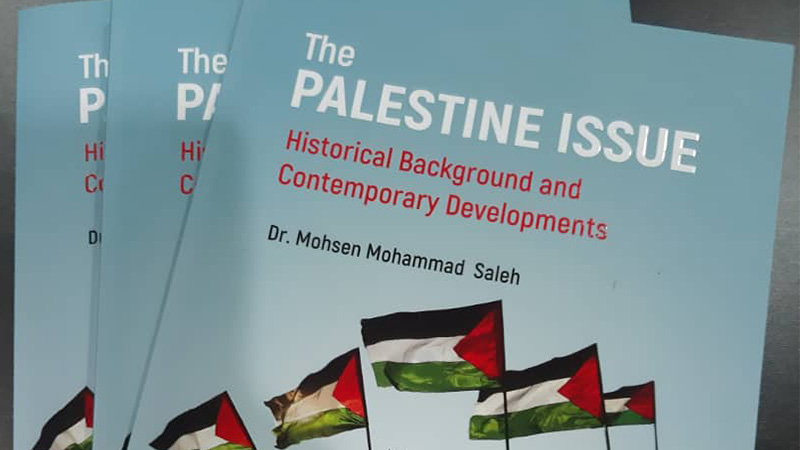
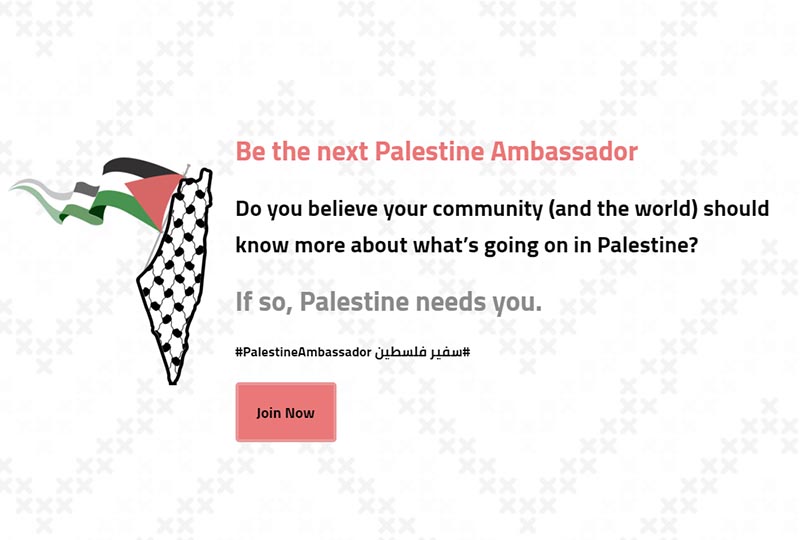

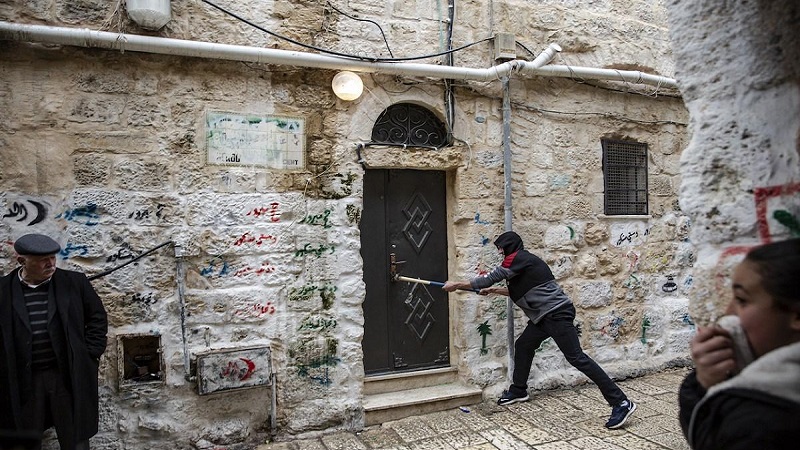
.jpg)

